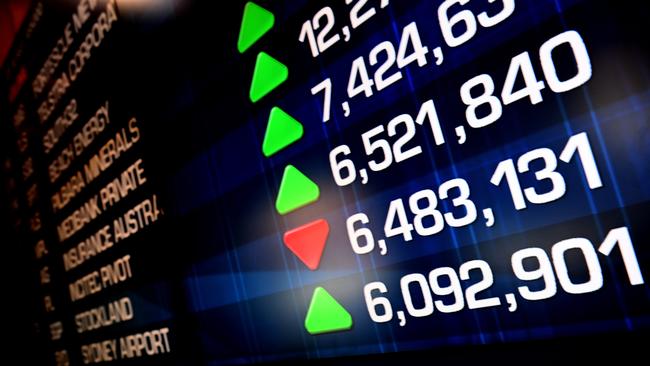
That’s the question that investors will be aiming to answer heading into what will be a critical few weeks of earnings results which will shine a light on the health of corporate Australia.
The past two months have been a rollercoaster for many companies as they veered from navigating a rapid economic recovery to being hit with summer’s Omicron wave and the supply-chain headaches and labour squeeze that have come with that.
For the most part business has taken disruption in its stride, with managers learning how to be fleet-footed and adaptable where border closures, shortages, greater government involvement and overseeing virtual workforce has been the new normal.

After coming off the worst monthly sharemarket performance since March 2020 – down 6.3 per cent in January – investors need to factor in the uncertainty of Covid but also get across what is really going on inside a business by hopefully eliminating all the noise. Because at some point Australia will move from Covid storm to Covid normal.
And according to top stock picker Jamie Nicol, who oversees more than $7bn in funds at DNR Capital, investors more than ever need to be prepared for an equities market where inflation is washing through the economy. And this comes at a time that liquidity is being pulled from the market.

Costs are now already filtering up with a number of companies across all sectors including Ansell, Woolworths and even coal miner Whitehaven warning of an impact from inflation.
“The ability of companies to be able to pass on inflation will become really important,” says Nicol, who is DNR’s chief investment officer.
He points out that most investors haven’t seen an inflationary environment as Australia drove down inflation over the past two decades. But this suddenly changed from last September as supply squeezes drove up prices sharply.
The Reserve Bank of Australia on Tuesday admitted that inflation had taken hold faster-than-expected and is bracing further gains in coming months.
Even so, the RBA believes the current annual underlying inflation rate at 2.6 per cent is transitory, with its central forecast is for underlying inflation to increase further in coming quarters. It sees it peaking at around 3.25 per cent, before declining to around 2.75 per cent over next year as the supply-side problems are resolved and consumption patterns normalise.
While the RBA held its nerve by resisting raising the cash rate from current ultra low levels,
economists are tipping cash rates to start rising from August to curb inflation.
“One source of uncertainty is the persistence of the disruptions to supply chains and distribution networks and their ongoing effects on prices,” RBA governor Philip Lowe noted after the central bank’s monthly board meeting.

Others are also planning for entrenched inflation with rising costs and higher interest rates the “biggest challenge” for investment markets at present, said Future Fund chairman and former Treasurer Peter Costello on Tuesday.
“We have come through a period of exceptional stimulation through monetary policy. This policy will have to come to an end. The adjustment will be significant,” Costello said.
One way or another business needs to factor inflation into every aspect of its planning.
DNR’s Nichol said a lot of companies have done a pretty good job over the last decade in terms of setting up contracts so they can pass on inflation to the customers but pricing rises might be between three and six-month lags.

“At the moment, it needs to be shorter than that, and that lag is causing them problems as they try to keep up with the tightness of the supply chain. A number of companies might get caught with that.”
But inflation isn’t necessarily a negative story for investors, with some businesses set to emerge as inflation winners. Banks get to rebuild their interest margins and some companies that require large amounts of cash to be held – such as share registry business Computershare – will see the benefit of higher interest rates.
Amid the wild swings in the stock market over the past four week, investors also need to be prepared to revisit their view of the Covid winners and losers, Nichol says.
“What are the sustainable earnings for companies in the post-Covid world?
“The last couple of years, you’ve had disruption from Covid and Omicron. You’ve had a stimulus which has inflated earnings. And so as we start to normalise, what does that mean for earnings across a lot of companies?”
“It’s when you start to bake that disruption into your forecast. And that’s where there could be some opportunities. You expect us to have ongoing normalisation to occur over the next year. And if that occurs, then there is going to be some opportunity for upside,” he says.
The most recent update from Nicol’s flagship DNR’s Australian Equities High Conviction Fund shows it returned nearly 24.5 per cent over the past year and outperformed the benchmark by more than 7.4 per cent. The fund, which holds up to 30 stocks at any one time, has outperformed on a six-month measure and on each of its measures since inception 20 years ago.

And for Nicol, one of the strongest lessons coming through from the pandemic is that management matters more than ever.
Managers are now under more scrutiny than ever from boards, investors and social media means they are accountable in real time.
“You see the ability of good managers to be flexible and focused on shareholder value. You want a really alert management team running the business particularly when you have supply-chain issues. It’s very easy to be distracted as those cost pressures can come through,” he says.
On this front the scorecard for Australian companies is generally good. But there are risks that we are part-way through the economic cycle and problems stemming out of the Covid disruption setting in now simply haven’t yet bubbled up to the surface.
johnstone@theaustralian.com.au




Two years into the chaos of the Covid pandemic, what does normal look like for business?